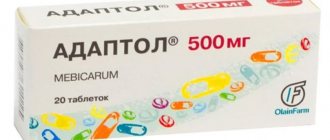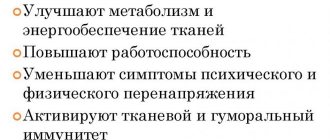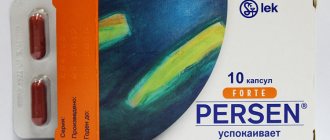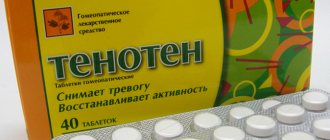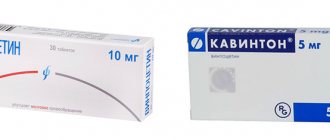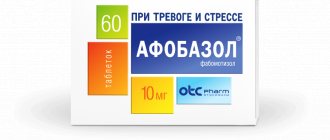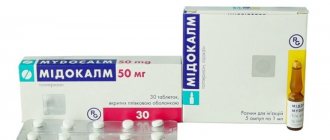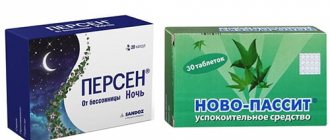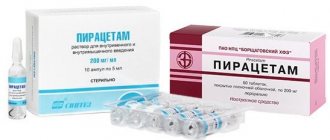- Phenibut or Anvifen?
- Reviews from doctors
- Where can I buy?
Phenibut and Anvifen are drugs that do not differ in their effects on the body.
They are analogues of each other. The composition of both drugs is based on aminophenylbutyric acid. Their effect is aimed at stabilizing the functioning of the central nervous system by normalizing the metabolism of its tissues. It is a mistake to believe that these are two drugs with completely similar composition. Auxiliary components may differ, but the effect on the body is the same.
The following drugs are prohibited:
- people suffering from liver diseases;
- for those who have individual intolerance to elements in the composition of the drug;
- pregnant women, women during lactation;
- children under three years old;
- people with diseases of the gastrointestinal tract.
There are discrepancies (subjective opinions) in side effects. Phenibut has more of them: drowsiness, nausea, causeless anxiety, nervous agitation, allergic reactions, headaches; Anvifen only causes drowsiness.
Description of drugs
Anvifen and Phenibut are medications that have both nootropic and sedative effects. The main active substance of these medicines is aminophenylbutyric acid. Does it turn out to be the same thing? To find out what the difference is, let's take a closer look at each of them.
Anvifen
It has a sedative and anti-anxiety effect, resulting in improved memory performance, increased concentration and performance, normalized blood circulation in the brain and oxygen saturation of cells. Anvifen is prescribed:
- In states of anxiety, constant fear or worry, excessive irritability;
- For the treatment of neuroses;
- To improve sleep quality;
- To relieve neurotic problems during alcohol withdrawal;
- To prevent dizziness and motion sickness;
- In pediatrics to get rid of hyperactive behavior, stuttering, enuresis, nervous tics.
Phenibut
It is also an anti-anxiety and nootropic agent. It is prescribed in the same cases and has the same therapeutic effect as Anvifen.
Phenibut and Anvifen equally influence the functionality of the body and have the same therapeutic properties.
Anvifen and Phenibut do not differ in pharmacological properties; they are complete analogues and generics. Both are nootropics that have a positive effect on brain function, improving blood circulation, memory, attention, concentration, and performance. They also have an anti-anxiety effect - relieve symptoms of anxiety, fear, neuroses, increase initiative, mood, and normalize sleep.
Phenibut
Phenibut is a nootropic drug whose active substance is aminophenylbutyric acid. The drug has no psychostimulating, antioxidant and tranquilizing effects on the human body.
Simply put, the drug has a sedative effect, improves memory, performance, vision, stabilizes coordination of movements, and also normalizes blood circulation in the brain, due to which it is saturated with oxygen.
Due to these effects on the human body, Phenibut is prescribed in the following cases:
- In case of disturbances in the functioning of the vestibular apparatus. In this disease, the drug is used to prevent dizziness and motion sickness during travel;
- For older people to normalize sleep;
- For Meniere's disease;
- In long-term anxiety states, accompanied by feelings of fear and anxiety;
- Psychopathological disorders occurring against the background of withdrawal syndrome, which occurs after withdrawal from drugs and alcoholic beverages;
- Primary open-angle glaucoma;
- Phenibut can be prescribed for such phenomena as nystagmus - involuntary and frequent oscillatory eye movements;
- Prevention of stressful situations before operations or serious diagnostic tests;
The drug is also used in pediatric practice for the treatment of nervous tics, stuttering, enuresis of inorganic nature, and hyperactive behavior.
Application
Using these drugs:
- Circulation and tone in the vessels of the brain are optimized.
- Anxiety, overexcitability, and excitement go away.
- Functionality increases and learning becomes easier.
- The transmission of impulses to the central nervous system increases.
Both drugs have the same contraindications, such as:
- Pregnancy;
- Lactation period;
- Individual intolerance to substances.
The side effects are also the same. Against the background of improper medication use and overdose, symptoms such as:
- Drowsiness;
- Nausea or vomiting;
- Allergic reactions.
Anvifen
To find out what the difference is between Anvifen and Phenibut, it is necessary to characterize the second drug.
Anvifen is a drug based on aminophenylbutyric acid that has a nootropic effect. Thus, it turns out that Anvifen and Phenibut have the same effect on the body and indications .
Accordingly, both drugs have the same contraindications, which include:
- Pregnancy. Despite the fact that no negative effects on the fetus have been identified when using the drug during pregnancy, taking the drug is contraindicated in pregnant women, especially up to 12 weeks after conception. In the 2nd and 3rd trimester, use is possible only under strict doctor’s instructions;
- Lactation period;
- Children under 3 years of age. Before this age, the drug can be taken only according to the strict indications of a specialist;
- Individual intolerance to drugs.
Anvifen and Phenibut should be taken with caution in case of liver failure and ulcerative and erosive lesions of the gastrointestinal tract.
Despite the fact that the drugs Anvifen and Phenibut, when used correctly, do not cause increased drowsiness, during treatment you should avoid engaging in potentially hazardous activities that require increased attention.
Course and dosage
The instructions for use of Anfiven and Phenibut indicate identical dosages of use and course of treatment, since these are analogues, there are no differences. Most often, the course of use of the drug is 2-3 weeks, but can be increased to 6-8 weeks. The drugs are taken three times a day. Adults and children over 14 years of age are prescribed 250-500 mg per dose, children over 8 years old - 250 mg, children over 3 years old - 50-100 mg per dose.
It is recommended to take these medications before meals.
Side effects and symptoms of overdose
If both drugs are taken incorrectly, side effects may occur in the form of irritability, drowsiness, anxiety and restlessness, headaches, and allergic manifestations.
Symptoms associated with exceeding the prescribed dosage include:
- Drowsiness;
- Nausea, sometimes vomiting;
- Allergic reactions in the form of skin rashes and itching;
- At high doses of more than 7 g, fatty liver degeneration occurs;
- Change in blood picture;
- Renal dysfunction;
- Hypotension.
- The drugs are considered low-toxic, therefore, only in the case of long-term use of drugs, in a daily dosage of 7-14 g, can symptoms of toxic effects on the liver be observed.
If these symptoms occur while taking Phenibut or Anvifen, urgent consultation with a specialist is required. On your own, before being examined by a doctor, you can rinse your stomach and take enteric sorbents, such as activated carbon, at the rate of 1 tablet per 10 kg of weight.
Differences
Despite the above similarities, the drugs are not identical. Let's look at how the means differ.
- Release form. Anvifen is produced in the form of capsules, and Phenibut is produced in different forms - capsules, tablets, powder.
- Dosage of one capsule. Phenibut is mainly available in 250 mg doses. Anvifen has a wider choice - 25, 50, 125, 250 mg. If the drug is prescribed in doses less than 250 mg, administration is more convenient, since there is no need to divide the tablet.
- Production. The drugs are produced by different manufacturers. Anvifen is produced in Russia, and Phenibut in Russia, Belarus, Latvia, and the USA. Products produced in Latvia and the USA are of higher quality, since they pay more attention to quality control of the raw materials used and compliance with the standards of each production process.
- Price. Depends on production and dosage. Prices for drugs from Russian manufacturers Phenibut and its analogue in the same dose are different, the price of the second is higher.
- Time-tested. Phenibut has been produced for quite a long time, it has managed to prove itself over the years of medical practice, Anvifen is relatively new, but at the same time it is a modern drug of a new generation.
The differences between the products are not significant, so it is possible to consider them generics or analogues.
Comparison of addiction between Anvifen and Phenibut
Like safety, addiction also involves many factors that must be considered when evaluating a drug.
So the totality of the values of such parameters as “syndrome o” in Anvifen is less than the similar values in Phenibut. Withdrawal syndrome is a pathological condition that occurs after the cessation of intake of addictive or dependent substances into the body. And resistance is understood as initial immunity to a drug; in this it differs from addiction, when immunity to a drug develops over a certain period of time. The presence of resistance can only be stated if an attempt has been made to increase the dose of the drug to the maximum possible.
Reviews
Here are reviews from doctors who use these drugs in their practice and from patients taking them:
- “I use Anvifen in treatment because of its more convenient form and dosage for children.”
- “I prefer to prescribe Anvifen, as it is a more modern drug; in my practice, it causes less side effects.”
- “The actions of the drugs are no different; I choose the prescription based on ease of administration, depending on the required dosage.”
- “After the introduction of Anvifen, I switched to a more convenient dosage form.”
- “I have been prescribing Phenibut to elderly patients for a long time to normalize sleep and prevent memory loss, the drug successfully copes with the tasks” (gerontologist).
- “Anvifen has a wider range of dosages, so it is convenient to use, the effects of the drugs are identical” (neurologist).
- “I have been taking Phenibut in courses for a long time, it helps me greatly to increase concentration, attention, memory, and at the same time my performance does not decrease while taking the course.”
- “I take Phenibut and notice improved memory and sleep” (patient).
- “I like Anvifen, it’s conveniently divided into capsule doses, it helped solve my problems.”
- “I had constant anxiety and irritability, the doctor prescribed me Anfiven, and I very quickly noticed an improvement in my condition.”
- “Phenibut helped me in treating motion sickness; after using it, traveling was no longer a torment.”
- “I’ve been taking Phenibut courses for a long time, it helps me keep myself in fighting condition, quickly restore strength, and sleep well” (athlete).
In reviews and comparisons of these medications, users note the convenience of taking Anvifen, especially when prescribed in low dosages. Others prefer to use Phenibut as a time-tested remedy. In terms of treatment effectiveness, both drugs are effective and work equally.
It is impossible to determine which drug is better, more effective. The only advantage of Anvifen is its ease of administration and variety of dosages. In cases where the dosages are non-standard, for children, it is best to choose it. In other cases, they can be replaced with each other. This will not affect the course of the treatment process.
Simultaneous use
Since both medicines are based on the same active ingredient, taking the drugs at the same time, especially in the maximum dosage, is dangerous . After all, simultaneous use of Anvifen and Phenibut can cause overdose symptoms, which will negatively affect a person’s health and general condition.
It will not be possible to single out one more effective remedy among these drugs, because they are complete analogues of each other. The only thing that is better than Anvifen is ease of administration and a variety of dosages. Therefore, if the drug is prescribed in a lower dosage than 250 mg, then it is better to give preference to Anvifen. In other cases, if one of the medicines is not available in the pharmacy, you can replace Anvifen with Phenibut, and vice versa.
Comparison of side effects of Anvifen and Phenibut
Side effects or adverse events are any adverse medical event that occurs in a subject after administration of a drug.
Anvifen has more adverse effects than Phenibut. This implies that the frequency of their occurrence is low with Anvifen and low with Phenibut. Frequency of manifestation is an indicator of how many cases of an undesirable effect from treatment are possible and registered. The undesirable effect on the body, the strength of influence and the toxic effect of drugs are different: how quickly the body recovers after taking it and whether it recovers at all. When using Anvifen, the body's ability to recover faster is higher than that of Phenibut.
